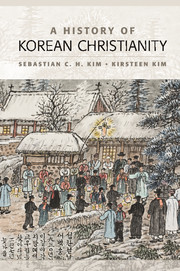Book contents
- Frontmatter
- Contents
- Illustrations
- Acknowledgements
- Abbreviations
- Maps
- Chapter 1 Introduction
- Chapter 2 Believers, Martyrs and Missionaries, 1592–1876
- Chapter 3 Evangelism, Patriotism and Revivalism, 1876–1910
- Chapter 4 Oppression, Resistance and Millennial Hope, 1910–1945
- Chapter 5 Liberation, Service and Divisions, 1945–1961
- Chapter 6 Growth, Thought and Struggle, 1961–1988
- Chapter 7 Missions, Reconciliation and Public Life, 1988–Present
- Glossary
- Bibliography
- Index
Chapter 3 - Evangelism, Patriotism and Revivalism, 1876–1910
Published online by Cambridge University Press: 05 March 2015
- Frontmatter
- Contents
- Illustrations
- Acknowledgements
- Abbreviations
- Maps
- Chapter 1 Introduction
- Chapter 2 Believers, Martyrs and Missionaries, 1592–1876
- Chapter 3 Evangelism, Patriotism and Revivalism, 1876–1910
- Chapter 4 Oppression, Resistance and Millennial Hope, 1910–1945
- Chapter 5 Liberation, Service and Divisions, 1945–1961
- Chapter 6 Growth, Thought and Struggle, 1961–1988
- Chapter 7 Missions, Reconciliation and Public Life, 1988–Present
- Glossary
- Bibliography
- Index
Summary
In the 1860s and 1870s French gunboats, Russian infiltration, American business and Japanese designs threatened Korea from all sides, and internally there was much suffering and unrest. It was clear that ‘Korea was not the arbiter of its own destiny but that its fate would be decided by outside powers motivated by their particular selfish interests’ (Lee Ki-baik 1984:281). By the 1870s many Koreans had heard of Christianity. Owing to Catholic resistance to oppression, it was well known that Jesus Christ had been crucified, although Christian doctrines had been distorted by Catholicism’s political opponents and by Donghak teaching (D. Chung 2001:68). Catholicism was known to be inclusive of the poor and outcaste and, like popular Buddhism, to have a compassionate female figure in Mary, the mother of Jesus. Catholicism had opened up Korea to outside influences and in many respects paved the way for modernity and for other forms of Christianity. But in the late nineteenth century Korea was strongly anti-Western and Cheonjugyo, the Teaching of the Heavenly Lord (Catholicism), was distrusted by many who associated it with treason and collusion with foreign powers.
Meanwhile, Protestant Christianity was spreading in East Asia, especially by the translation and distribution of the Bible and other literature and by literacy work (Neill 1990:209). The first Bible in Chinese was published in 1823, and the production of other Protestant literature in Chinese was booming. By 1870 there were about eight hundred different tracts and books, in addition to scriptures, commentaries and hymnals. Among the most popular were William Burns’s translation of The Pilgrim’s Progress and William A. P. Martin’s Evidences of Christianity (Dixon 2012; Oak Sung-deuk 2006). These were distributed by Chinese colporteurs in the employ of the missions and were certainly being smuggled into Korea by the 1870s. So, as had occurred with Catholicism, it was through Chinese literature that Koreans first encountered Protestant Christianity. These works were to have an ongoing influence on the formation of Korean Christianity through the terminology they introduced (Oak Sung-deuk 2013:308–10).
- Type
- Chapter
- Information
- A History of Korean Christianity , pp. 54 - 106Publisher: Cambridge University PressPrint publication year: 2014



